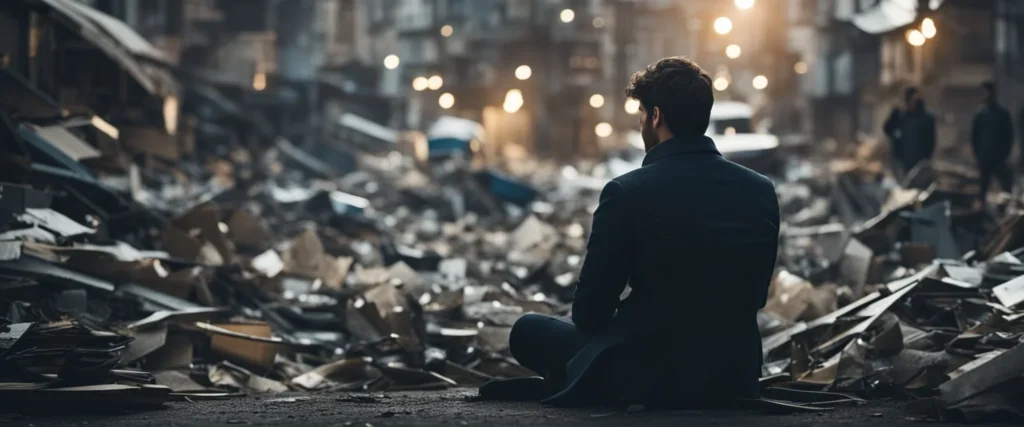Short Answer: If you’re trying to determine whether you’ve experienced trauma, there are certain signs to be aware of. These include persistent thoughts that intrude your mind, avoiding situations that remind you of the event, experiencing a shift in your mood or thinking, and changes in how you react or respond to things. Symptoms can appear as recurring nightmares, emotional upset, sleep disturbances, heightened irritability, and issues with focusing. If these signs persist and disrupt your daily activities, it’s crucial to reach out to a mental health professional. It’s important to remember that everyone’s trauma experience is different and seeking help is a positive step.
If you have experienced a traumatic event, you may be wondering if you are suffering from trauma. Trauma can manifest in many different ways, and it can be difficult to recognize the symptoms. Understanding the signs of trauma can help you seek the help you need to heal and move forward.

Some common signs of trauma include nightmares, flashbacks, and intrusive thoughts related to the traumatic event. You may also find that you are easily triggered by reminders of the event, such as certain sounds or smells. You may feel anxious or on edge, and you may avoid situations or people that remind you of the trauma. Other symptoms can include feelings of numbness, detachment, or dissociation, as well as physical symptoms like headaches and stomachaches. If you are experiencing any of these symptoms, it is important to seek help from a mental health professional.
It is also important to remember that everyone experiences trauma differently, and there is no “right” way to react to a traumatic event. Some people may immediately feel the effects of trauma, while others may not experience symptoms until weeks or even months later. It is also possible to experience trauma from events that may not seem traumatic to others, such as emotional abuse or neglect. If you are unsure whether you have experienced trauma, it is always a good idea to speak with a mental health professional who can help you understand your experiences and guide you toward healing.
Understanding Trauma

As someone who has experienced trauma, it can be difficult to understand what exactly it is and how it affects you. In this section, I will define trauma and discuss some common causes of trauma.
Defining Trauma
Trauma is a response to an event or situation that is emotionally or physically distressing. This event or situation is often unexpected, overwhelming, and beyond our control. Trauma can result from a single event, such as a car accident or a natural disaster, or from ongoing experiences, such as abuse or neglect.
Trauma can impact us in a variety of ways, including our thoughts, emotions, and physical health. Some common symptoms of trauma include anxiety, depression, nightmares, flashbacks, and avoidance of certain people or situations. It’s important to note that not everyone who experiences trauma will develop these symptoms and that symptoms can vary widely from person to person.
Common Causes of Trauma
Many different events or situations can lead to trauma. Some common causes of trauma include:
- Natural disasters, such as hurricanes, earthquakes, or floods
- Accidents, such as car crashes or workplace injuries
- Physical or sexual assault
- Domestic violence
- Childhood abuse or neglect
- Military combat or exposure to violence during wartime
It’s important to note that trauma can also result from less visible events, such as emotional abuse or neglect. Additionally, what may be traumatic for one person may not be traumatic for another. Trauma is a highly individual experience and can vary depending on a variety of factors, including our past experiences, our support systems, and our coping skills.
In summary, trauma is a response to an event or situation that is emotionally or physically distressing. It can impact us in a variety of ways, and many different events or situations can lead to trauma. By understanding what trauma is and what causes it, we can begin to take steps towards healing and recovery.
Symptoms of Traumatization

Experiencing a traumatic event can have a profound impact on our emotional and physical well-being. Trauma can affect us in different ways, and the symptoms can vary from person to person. It is important to recognize the signs of traumatization so that we can seek help and support when we need it.
Emotional and Psychological Symptoms
Trauma can cause a range of emotional and psychological symptoms. If you have experienced a traumatic event, you may notice that you are:
- Anxious and fearful: You may feel on edge, have a sense of impending danger, or feel like you are constantly on guard.
- Depressed and hopeless: You may feel sad, empty, or hopeless about the future.
- Angry and irritable: You may feel easily frustrated, short-tempered, or have outbursts of anger.
- Numb and detached: You may feel emotionally numb, disconnected from others, or have difficulty experiencing pleasure.
- Guilt and shame: You may blame yourself for the traumatic event or feel ashamed of your reactions to it.
Physical and Behavioral Symptoms
Trauma can also cause physical and behavioural symptoms. If you have experienced a traumatic event, you may notice that you are:
- Fatigued and exhausted: You may feel tired all the time, have trouble sleeping, or have difficulty concentrating.
- Hyperaroused: You may have a heightened startle response, be easily startled, or have difficulty sleeping.
- Avoidant: You may avoid people, places, or things that remind you of the traumatic event.
- Substance abuse: You may turn to drugs or alcohol to cope with the emotional pain.
- Self-harm: You may engage in self-harm behaviours, such as cutting or burning, to cope with the emotional pain.
It is important to note that not everyone who experiences a traumatic event will develop symptoms of traumatization. However, if you are experiencing any of these symptoms, it is important to seek help from a mental health professional who can provide support and guidance.
Acknowledging Your Trauma

If you’re wondering if you’ve been traumatized, the first step is acknowledging that you may have experienced trauma. This can be difficult to do, as trauma can manifest in many different ways and may not always be immediately recognizable.
Self-Assessment
One way to begin assessing whether you’ve experienced trauma is to ask yourself some questions. These questions can help you identify symptoms of trauma and determine if you may need to seek help:
- Have you experienced a traumatic event, such as a car accident, physical assault, or natural disaster?
- Do you experience flashbacks or nightmares related to the traumatic event?
- Do you avoid situations or activities that remind you of the trauma?
- Do you feel anxious, irritable, or on edge?
- Do you have trouble sleeping or concentrating?
- Have you experienced changes in your appetite or weight?
- Do you feel detached from others or have trouble forming close relationships?
- Do you feel guilty or responsible for the traumatic event?
If you answered yes to some of these questions, you may have experienced trauma.
Barriers to Recognition
Acknowledging trauma can be difficult for several reasons. Some common barriers to recognizing trauma include:
- Minimizing the severity of the event: it’s important to remember that trauma can affect people differently, and what may be traumatic for one person may not be traumatic for another.
- Feeling ashamed or embarrassed: it’s common to feel ashamed or embarrassed about experiencing trauma, but it’s important to remember that trauma is not your fault and seeking help is a sign of strength.
- Fear of judgment or stigma: there is still a stigma surrounding mental health and seeking help for trauma, but it’s important to remember that seeking help is a brave and necessary step towards healing.
Remember that acknowledging trauma is the first step towards healing. If you suspect that you may have experienced trauma, it’s important to seek help from a mental health professional who can help you navigate the healing process.
Seeking Professional Help

If you are struggling with symptoms of trauma, seeking professional help can be crucial for your recovery. A mental health professional can help you develop coping strategies and provide support as you work through your trauma.
When to Seek Help
It can be difficult to know when it’s time to seek help for trauma. If you are experiencing symptoms such as flashbacks, nightmares, or anxiety that are interfering with your daily life, it may be time to seek professional help. Additionally, if you feel overwhelmed and unable to cope with your feelings, or if you are using drugs or alcohol to cope with your trauma, it’s important to seek help.
It’s important to remember that seeking help for trauma is a sign of strength, not weakness. It takes courage to seek help and work through difficult emotions.
Types of Trauma Therapy
Several types of therapy can be effective in treating trauma. Some common types of trauma therapy include:
- Cognitive-behavioural therapy (CBT): Cognitive Behavioral Therapy (CBT) is a therapeutic approach that centres around modifying unfavourable thought patterns and maladaptive behaviours. It can help treat PTSD and other trauma-related disorders.
- Eye movement desensitization and reprocessing (EMDR): EMDR is a type of therapy that involves recalling traumatic memories while following a therapist’s finger or light. It can help reduce the intensity of traumatic memories.
- Exposure therapy: Exposure therapy is a process where the individual is slowly introduced to the distressing event in a secure and managed setting. This method aids the individual in managing their emotions and lessening the severity of their symptoms.
- Mindfulness-based therapy: Mindfulness-based therapy involves learning to be present in the moment and accepting difficult emotions without judgment. It can help reduce symptoms of anxiety and depression related to trauma.
Remember, there is no one-size-fits-all approach to trauma therapy. It’s important to find a therapist who specializes in trauma and who you feel comfortable working with.
Overall, seeking professional help can be an important step in healing from trauma. With the right support and treatment, it’s possible to let go of trauma and move forward with your life.
Self-Help Strategies

Dealing with trauma can be a challenging and overwhelming process, but there are some self-help strategies that you can try to help you cope and build resilience. In this section, we will discuss two important strategies: coping mechanisms and building resilience.
Coping Mechanisms
Coping mechanisms are strategies that you can use to manage your emotions and reduce stress. Here are some coping mechanisms that you can try:
- Deep breathing exercises: Take a few deep breaths and focus on your breath as it goes in and out. This can help you feel more relaxed and calm.
- Journaling: Write down your thoughts and feelings in a journal. This can help you process your emotions and gain insight into your experiences.
- Exercise: Physical activity can help reduce stress and improve your mood. Try going for a walk, practicing yoga, or doing some other form of exercise that you enjoy.
- Mindfulness: Practice being present in the moment and observing your thoughts and feelings without judgment. This can help you feel more grounded and less overwhelmed.
Building Resilience
Building resilience means developing the ability to bounce back from difficult experiences. Here are some ways to build resilience:
- Self-care: Take care of yourself by getting enough sleep, eating well, and engaging in activities that you enjoy.
- Connecting with others: Reach out to friends and family members for support. You can also consider joining a support group or seeking professional help from a therapist.
- Positive self-talk: Challenge negative thoughts and replace them with positive affirmations. For example, instead of saying “I’m not good enough,” say “I am capable and deserving of love and happiness.”
- Letting go of trauma: It’s important to acknowledge and process your trauma, but it’s also important to let it go and move forward. This can be a difficult process, but it’s important to focus on the present moment and the positive things in your life.
Remember, healing from trauma is a process and it takes time. Be patient with yourself and try to practice self-compassion. With time and effort, you can learn to cope with your trauma and build resilience.
Support Systems

Dealing with trauma can be incredibly difficult, but it’s important to remember that you don’t have to go through it alone. Having a support system in place can make a huge difference in your recovery. In this section, we’ll discuss the role of the community and how to find support groups.
Role of Community
Community support can be incredibly helpful in the aftermath of trauma. Whether it’s friends, family, or neighbours, having people who care about you and are there to listen can make a big difference. It’s important to reach out and let people know what you’re going through. You may be surprised at how many people are willing to help.
In addition to personal relationships, there are also community resources available. Local organizations, such as churches or community centres, may offer support groups or counselling services. These resources can be a great way to connect with others who have experienced similar trauma and get the help you need.
Finding Support Groups
Support groups can be a great way to connect with others who have experienced trauma. They provide a safe space to share your feelings and experiences and can offer a sense of community and belonging. There are many different types of support groups available, so it’s important to find one that fits your needs.
One way to find support groups is to ask your healthcare provider or therapist for recommendations. They may be able to refer you to a group that specializes in trauma recovery. You can also search online for local support groups in your area.
When looking for a support group, it’s important to find one that is a good fit for you. Consider factors such as the size of the group, the format of the meetings, and the focus of the group. It’s okay to try out a few different groups before finding the right one.
Remember, seeking support is a sign of strength, not weakness. Don’t be afraid to reach out and ask for help when you need it. With the right support system in place, you can begin to heal and move forward from your trauma.
Moving Forward

Dealing with trauma is not easy but it is possible to move forward and heal. In this section, I will discuss two key aspects of moving forward from trauma: acceptance and forgiveness, and growth and post-traumatic growth.
Acceptance and Forgiveness
The first step in moving forward from trauma is to accept what has happened and forgive yourself. It’s important to understand that the trauma was not your fault and that you did the best you could at the time. By accepting what has happened, you can start to let go of the pain and move forward with your life.
Forgiving yourself can be difficult, but it’s an important step in the healing process. Remember that you are not defined by your trauma and that you have the power to create a better future for yourself. Be kind to yourself and give yourself time to heal.
Growth and Post-Traumatic Growth
While trauma can be incredibly difficult to deal with, it can also be an opportunity for growth. Post-traumatic growth is the idea that people can grow and develop in positive ways as a result of their trauma. This growth can come in many forms, such as increased resilience, a deeper appreciation for life, and a stronger sense of purpose.
To experience post-traumatic growth, it’s important to focus on the positive aspects of your life and to find meaning in your experiences. This can involve connecting with others who have experienced similar traumas, volunteering, or pursuing a new hobby or interest.
Moving forward from trauma is a process, and it’s important to be patient with yourself. Remember that healing takes time, but with the right mindset and support, it is possible to move forward and create a brighter future for yourself.


